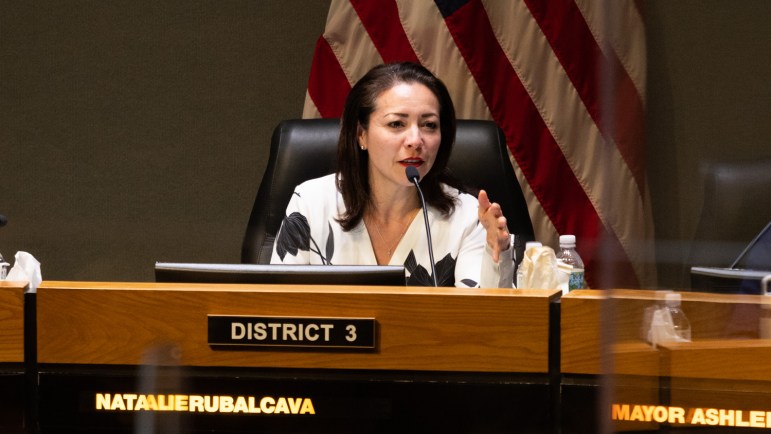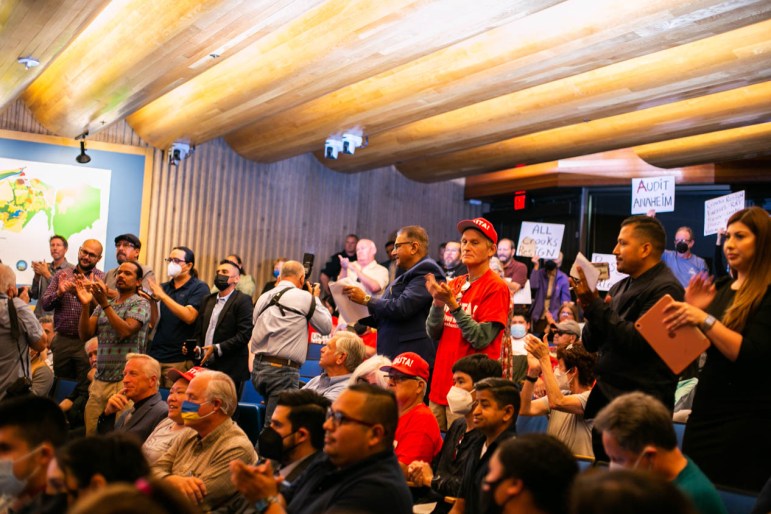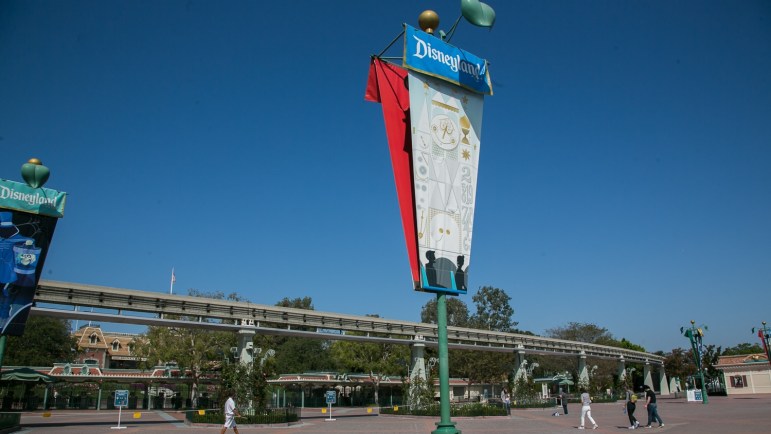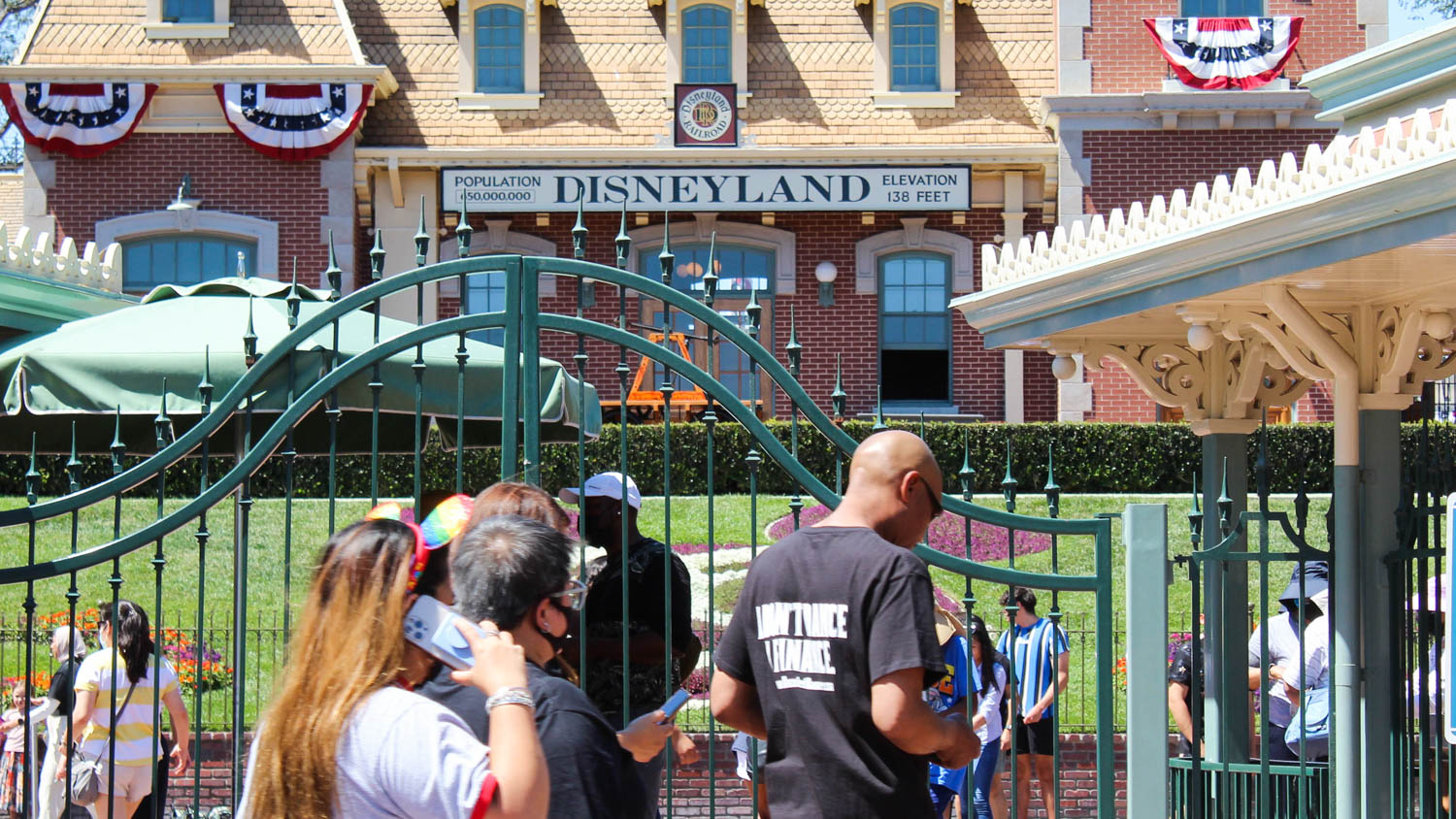For years, it was taboo for Anaheim City Council members to publicly raise the idea of a gate tax on Disneyland and other large entertainment venues in Orange County’s largest municipality.
Yet tight budgets seem to force hard discussions.
With city officials grappling with a roughly $64 million budget deficit – a gap filled with bond money and other one-time spending earlier this year – Councilwoman Natalie Rubalcava this week opened the door to a discussion about a gate tax.
[Read: Orange County Cities Scramble to Patch Budget Gaps]
It’s an unprecedented move from a council member whose campaign was heavily backed by Disney.
Rubalcava’s move is also a noteworthy twist on a council where five of the seven members have had their campaigns heavily backed by Disney and other resort businesses – the very interests who’ve historically opposed talks of a gate tax.
During Tuesday’s meeting, Rubalcava said she wants the city to generate new revenue from tourists and “not on the backs of the people who live here.”
She’s eying places like Disneyland, the Honda Center and the upcoming OC Vibe through having city staff explore “new revenue generating opportunities through an entertainment tax.”
She also noted Anaheim is in “about $60 million in deficit.”
Rubalcava, a Democrat whose 2022 campaign was heavily backed by Disney and other resort interests, said the city should get some money from the Mickey and Friends parking garage, which was paid for with bond money from the 1997 Disneyland expansion.
“We are growing but our budget is not growing, unfortunately. And we cannot continue to just depend on TOT (hotel bed taxes),” Rubalcava said. “I think it’s kind of time at this point for us as an elected body to review this.”
 Anaheim councilwoman Natalie Rubalcava on Jan. 23, 2024. Credit: JULIE LEOPO, Voice of OC
Anaheim councilwoman Natalie Rubalcava on Jan. 23, 2024. Credit: JULIE LEOPO, Voice of OC
City staff said they would likely have something before the city council at the Sept. 23 meeting.
Rubalcava said it’s better to have the debates sooner than later because she wants to get it on the November 2026 ballot.
Fallout From a Corruption Scandal
The gate tax proposal comes after the 2022 city hall corruption scandal, which publicly surfaced after the city tried to sell Angel Stadium to the team owner.
In federal court filings, FBI agents revealed disgraced former Mayor Harry Sidhu tried ramming the deal through expecting $1 million in campaign contributions.
Throughout the scandal, independent investigators and FBI agents came to similar conclusions – Disneyland Resort interests held outsized influence on city policymaking.
[Read: Anaheim’s Own Look at City Hall Finds Disneyland Resort Businesses Improperly Steer Policymaking]
 Residents applaud their neighbors as they speak out against the recent FBI corruption probe in Anaheim and the Angel stadium land sale on May 24, 2022. Credit: JULIE LEOPO, Voice of OC
Residents applaud their neighbors as they speak out against the recent FBI corruption probe in Anaheim and the Angel stadium land sale on May 24, 2022. Credit: JULIE LEOPO, Voice of OC
Sidhu was eventually sentenced to two months in prison earlier this year and former Anaheim Chamber of Commerce CEO Todd Ament awaits his sentencing this November over the scandal.
The idea of an entertainment tax – or gate tax – has sparked considerable debate and controversy in Anaheim over the years.
Former Councilman Jose Moreno – who represented the same district Rubalcava now does – tried bringing the idea forward a couple of times during his tenure on the dais.
Each time it failed.
In 2022, Moreno pushed for a 2% gate tax on venues like Disneyland and the Honda Center.
[Read: Forced to Borrow to Meet Budget Deficits, City of Anaheim Mulls Disneyland Ticket Tax]
Much like today, the city was wrestling with multi-million dollar budget deficits as the local economy reeled from the pandemic shutdowns, which severely impacted tax revenue generated in the Disneyland Resort.
At the time, city staff estimated a 2% gate tax could bring in $55 million to $82 million in new revenue for Anaheim’s general fund – the most flexible pool of money available to elected officials.
In 2022, city staff said the gate tax wouldn’t apply to Angel Stadium because the Major League Baseball franchise is entitled to credits against any such tax – something spelled out in the team’s 1996 lease, which was controversially reinstated in 2019.
[Read: CA Auditors: Anaheim Doesn’t Know if Angel Stadium is Trashed]
At the time, the Disney-backed council majority – Sidhu’s close allies – rejected Moreno’s proposal ahead of the 2022 election.
[Read: Borrowing to Meet Budget, Anaheim Passes on Disneyland Ticket Tax]
In that election, two of Sidhu’s allies were voted out of office.
No member of Sidhu’s majority is left on the dais today.
Will Voters Get to Decide on a Gate Tax?
 The entrance to Disneyland in Anaheim on Oct. 6, 2020. Credit: JULIE LEOPO, Voice of OC
The entrance to Disneyland in Anaheim on Oct. 6, 2020. Credit: JULIE LEOPO, Voice of OC
Rubalcava, Disney-backed herself, is looking to put the question before Anaheim voters next year.
“I hope that this council is open to allowing our residents to weigh in on this really important ballot initiative and that would have to go to a general election. So that is in November 2026.”
While her proposal wasn’t scheduled on the agenda for Tuesday’s meeting – meaning council members couldn’t debate the issue – it did raise some hesitation from one of her colleagues.
Councilwoman Natalie Meeks, a Republican whose own campaign was heavily backed by Disney in 2022, said city staff should look to other revenue sources to help alleviate Anaheim’s budget woes.
“I have significant concerns on not diversifying our revenue sources,” Meeks said. “Our finance director has kind of said we are a one-trick pony here in visitor revenue. So are there other options that make more sense for us if we do have a long term shortfall? So those are other issues I would like staff to look at.”
She also said staff should examine the roughly $120 million in freed up money that’s slated to come in after the city pays off the bonds from the 1997 Disneyland expansion – some of which paid for the parking garage.
Anaheim is spending over $114 million of general fund money to pay down the 1997 bonds this fiscal year, according to the adopted budget.
The city has relied on hotel taxes to help boost revenue, but much of that goes to help pay down the 1997 bonds.
During this year’s budget process, city staff noted that hotel revenues fell 11% short of what was expected this fiscal year.
Rubalcava said much of the city’s hotel taxes go to help pay down the bonds, including the Mickey and Friends parking garage that Disney leases for $1 a year and the city plans to hand over to the entertainment juggernaut once the 1997 bonds are paid off.
“So that is also one of the reasons why I think having an assessment on parking would be significant,” she said. “I hope that our friends at these large entertainment venues will agree with us that it is conducive of them to help us generate the revenue needed to help our city move forward.”
Spencer Custodio is the civic editor. You can reach him at scustodio@voiceofoc.org. Follow him on Twitter @SpencerCustodio.
Related

